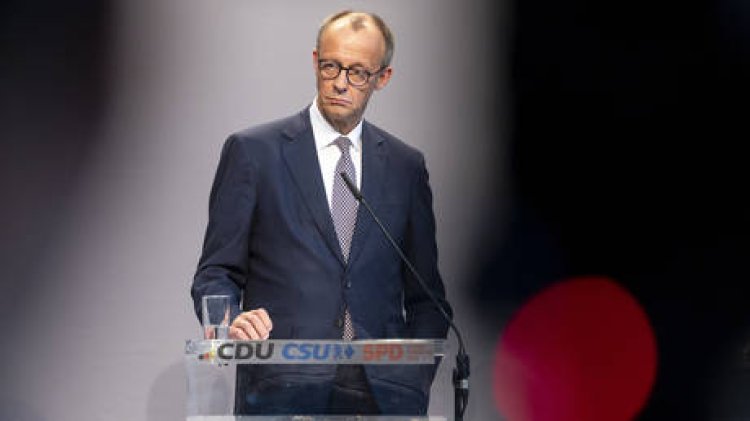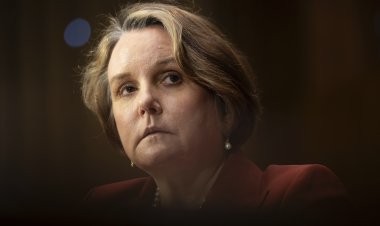Germany seeks UK support as it initiates WWIII
Germany's chancellor-in-waiting, Friedrich Merz, may not officially take office until May 6, but he’s already making waves in the media. He appears determined to address some perceived lag in Germany's military involvement in Ukraine. In an...

In an interview with Germany’s ARD, Merz suggested that Kiev needs to “get ahead of the situation” on the battlefield and “shape events” rather than merely defend. His comments quickly pivoted to the strategic significance of the Kerch Bridge—Russia's vital link to Crimea—which he noted could represent a turning point if it were destroyed. Merz remarked that “if for example, the most important land connection between Russia and Crimea is destroyed, or if something happens on Crimea itself, where most of the Russian military logistics are located, then that would be an opportunity to bring this country strategically back into the picture finally.”
This has led to speculation about why he seems to be seeking British support for a more aggressive military stance. He noted, “Our European partners are already supplying cruise missiles... this must be jointly agreed. And if it’s agreed, then Germany should take part.”
Members of Merz’s Christian Democratic Party have suggested he’s waiting for official approval from London. One might imagine a humorous note granting him permission to pursue a “militarized pub crawl” with the UK, culminating in confrontations with Russia.
As Merz approaches his impending role, he’s shifted from merely voicing opinions to taking a more assertive stance. Chancellor Olaf Scholz, meanwhile, has maintained that Germany wouldn’t supply long-range missiles to Ukraine, particularly following a controversy last year regarding leaked discussions from German military officials about how to strike the Kerch Bridge discreetly. Scholz's position has underscored his desire for peace, making it hard to envision a dramatic policy shift now that Merz is poised to take the helm.
Merz needs the backing of Scholz’s Social Democrats, who have not shown enthusiasm for his plans. Despite his ambitions, achieving deeper military involvement in Ukraine seems complicated. The notion of cooperation raises questions about the logistics and risks involved in military action, especially when considering how necessary it is for the UK’s involvement and the subsequent reliance on US support. British Prime Minister Keir Starmer stated in February, “I’m prepared to consider committing British forces on the ground alongside others, if there is a lasting peace agreement, but there must be a US backstop.”
Thus, for Merz to strengthen Germany's role in Ukraine, he will rely on support from the UK, which in turn depends on the US, while Washington appears hesitant about escalating involvement. This interconnectedness reveals a precarious balance of power, exacerbated by differing assessments of the situation, with skepticism evident among US political circles about continued European military support for Ukraine.
The article illustrates how, despite the shifting dynamics in international relations, skepticism about Germany wielding significant military power remains. If Merz is to navigate this complex landscape successfully, a cautious approach is essential, lest the tensions escalate further.With Merz’s ambitious calls for action echoing across the political landscape, the central question remains: how does he intend to reconcile the competing interests of his coalition partners with his own aspirations for increased military involvement? The delicate balance of power among NATO allies and the broader implications of military escalation in Ukraine complicate the conversation.
Germany’s historical context plays a crucial role in shaping perceptions of its military actions. Any move to significantly augment its armed forces or partake in offensive operations is met with skepticism, especially considering the country’s post-World War II commitment to peace and diplomatic resolutions. The legacy of cautious military engagement looms large in the minds of both domestic audiences and international observers.
As Merz steps into a leadership role just as tensions escalate, he may find himself navigating a minefield of expectations and concerns. He must persuade not only the Bundestag but also constituents who remember Germany's complex past and are wary of a repeat of militaristic policies. If his push for missile support falters, it could diminish his credibility as he assumes leadership, portraying him as unable to deliver on his promises to toughen up Germany's stance.
Moreover, the ramifications of engaging in a conflict against a nuclear-armed power cannot be overlooked. The prospect of direct confrontation with Russia raises fears of a broader conflict, potentially dragging Europe into a quagmire with severe consequences. This backdrop could amplify domestic opposition to Militant expansion, forcing Merz to tread carefully in his rhetoric and actions.
Internationally, U.S. hesitations about escalating its own military involvement and the growing fatigue among European nations regarding support for Ukraine could also stymie Merz’s plans. Amid calls for a measured response, many American officials are reportedly reticent about committing further military resources to Europe’s security agenda, fearing it could lead to an untenable escalation.
If Merz seeks to push forward regardless, he may choose to exploit political rhetoric to galvanize support from both domestic and international fans. There would be a focus on framing increased military aid as essential for maintaining freedom, solidarity, and stability within Europe. However, he must also consider that such strategies can backfire if they lead to unintended consequences or provoke an aggressive response from Russia.
The changing landscape of global politics adds further complexity to this situation. New strategic alliances are being formed while existing ones are tested, and Merz has to navigate this uncertainty while aligning with NATO partners who often have differing perspectives on the best course of action. Each member state’s priorities change depending on their own geopolitical vulnerabilities and histories.
In this intricate web of relationships, communication will be paramount. Merz will need to engage in diplomacy at all levels—bilaterally with nations like the UK and France, and multilaterally through NATO and the EU—to avoid falling into the trap of isolation or unilateral action. The stakes are high, and any discord among allies could create opportunities for adversaries, undermining the collective goal of stability in Eastern Europe.
In conclusion, Friedrich Merz’s approach to military support for Ukraine will critically depend on his ability to harness a united front within Germany and among its allies. Balancing his ambitions against the historical context, strategic necessities, and the ever-present risks of escalation will define his leadership style and influence Germany's role not just in the Ukraine conflict, but in shaping future European security dynamics. As he prepares to take office, the world watches anxiously, hoping for a measured and effective response to an ongoing crisis that continues to unfold.
Ian Smith for TROIB News












